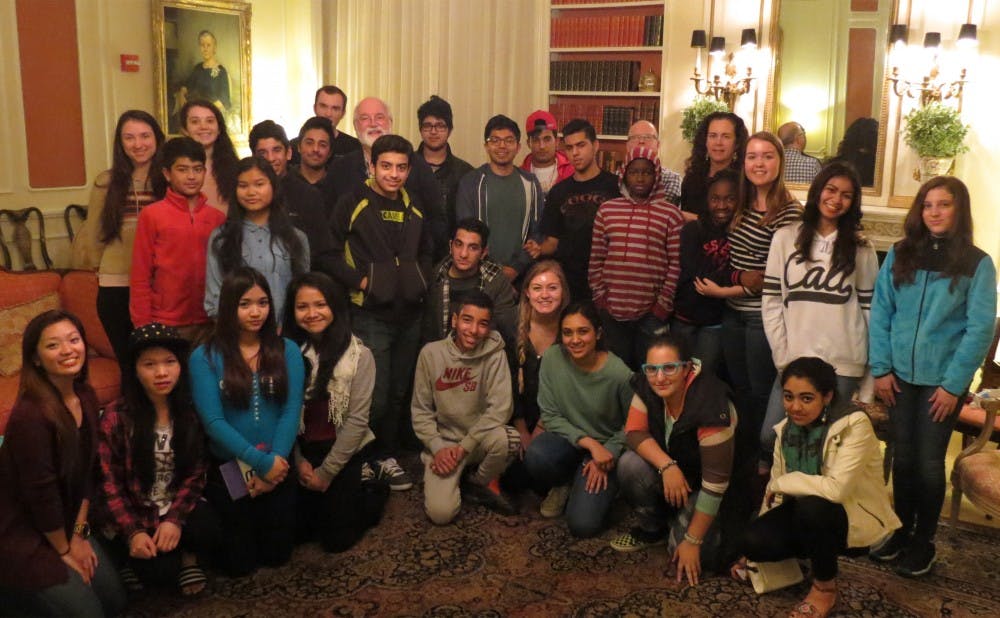A Bass Connections project started this year aims to increase civic participation among Durham refugees.
Faculty and students working on the project, called Citizenship Lab, are currently working with 23 refugees enrolled in Durham schools. Members of the lab—which is headed by Suzanne Shanahan, co-director of the Kenan Institute for Ethics and associate research professor in sociology, and Bill Tobin, visiting associate professor in sociology—said they hope to serve as academic and civic role models for the students, and to teach them about the Durham community and its offerings.
“Since this is our first year, our first challenge was to understand the particular challenges faced by a displaced population,” said Alex Oprea, a fourth-year graduate student studying political theory and civic education. “For all of [our students], we hope that because they know so many more people in the community, they’ll be able to use these community resources as they move forward. We’re trying to help them build a network and to understand that they’re not outsiders.”
North Carolina ranks 10th in the country in terms of refugee resettlement—with 2,500 refugees, predominantly from Bhutan, Burma and Iraq, settling in the Triangle area in the past three years, according to the Citizenship Lab website.
Shanahan explained in an email that the students in the program were recruited from local refugee families—primarily from the Middle East and Africa—that she had connected with in her previous project, which focused on refugee women in Durham.
The students are transported to Duke each week for group meetings with students and faculty to discuss their goals for the day, which can include working on projects and taking community field trips, Oprea said.
The high school students are primarily working on a project called “PhotoVoice” this semester, in which each refugee has been given a camera and asked to capture what community means to him or her.
“To do this project over multiple weeks the students will be taking lots of pictures,” Oprea said. “The undergraduate mentors will be going to their homes to take pictures with them on one or two different occasions. But during class time, [both the students and mentor] will be going through the photos, and they’ll be asking them to comment on questions, such as ‘Why did you take this photo, or how does this signify community?’”
In addition to local field trips, the lab has also brought in speakers from the community, Oprea added. Recently, Steve Schewel, Trinity ’73, visiting assistant professor at the Sanford School of Public Policy and Durham City Council member, engaged students in a discussion about the role of City Council and answered questions about their concerns as refugees.
Oprea added that the Duke faculty and students have worked to refine the program as they have learned more about community education and refugee issues. Initially, the lab emphasized the importance of political engagement and once took the refugees to cast their ballots through the Kids Voting Durham program.
“They definitely enjoyed the experience that was a part of [voting], but I think it was a little too abstract to really get at the core and understand what community and citizenship would mean to them,” Oprea said. “So then we started scaling back from the abstractness of voting and moving towards more concrete ways to explore community and religion and really draw out the meaning of citizenship.”
Both Opera and Shanahan noted that the families of refugee students and the students themselves have been very enthusiastic about the program and enjoy their interactions with Duke faculty and students.
“I recall an eighth-grade girl describing how she’s so happy when she wakes up on Tuesdays because she is coming to the Citizenship Lab but so sad on Wednesday morning because it’s a whole week until she gets to return,” Shanahan wrote. “The focus of our work is community, and they are building just that. It is increasingly an important space for them.”
Get The Chronicle straight to your inbox
Signup for our weekly newsletter. Cancel at any time.

